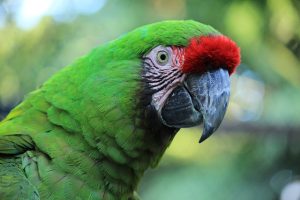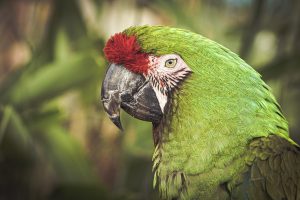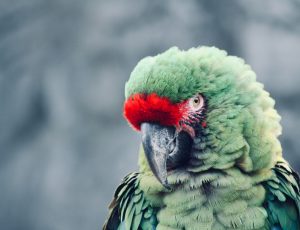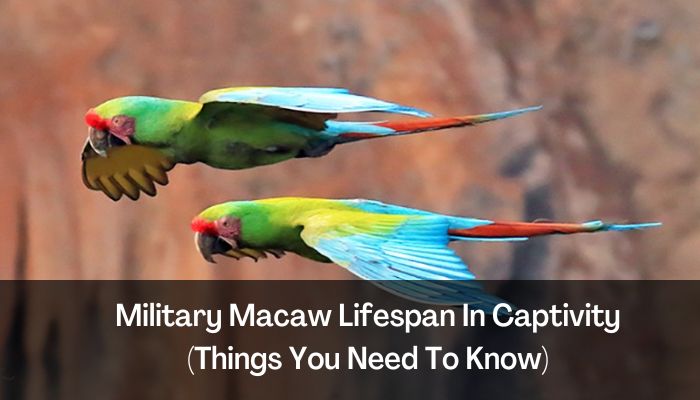Macaws are among South America’s most vibrant and stunning birds, but how long will they live in captivity? Macaws are a well-known species due to their size and beautiful plumage.
Military Macaws’ lifespan is 56 to 70 years in captivity, depending on many factors such as environment, food, and genetics.
Military Macaws have amazing personalities since each has distinctive preferences and dislikes. Macaws aren’t easy to take care of because of their size; however, for most bird owners, they’re worth taking on the task.
Find out more about military macaw lifespan in captivity and the way in which a natural setting or conditions in captivity could affect the length of their lives.
How Long Does a Military Macaw Live?

The lifespan of an average Military Macaw is 50 to 60 years. Due to this long lifespan, the majority of pets’ Military Macaws will outlive their owners.
The longevity of a macaw may be extended significantly when they are reared or held in captivity. The only exception is the Red-fronted macaw which appears to do much better in its natural environment.
The normal lifespan of a Military Macaw is approximately sixty years. They don’t live to this stage on the open land due to adverse situations. In captivity, they can live in a more favorable way because of proper care and diet. If they live in the wild, they could be victims of snakes, eagles, and other animals.
In Details on Military Macaw Life Expectancy
1. Life Expectancy in Wild
Military macaws reside in large groups and are around 50 to 60 years old out in the wild. They are frequently seen long before they are recognized. They can be loud birds, making many loud noises, including shrieking and cracking noises, which include an extremely high-pitched kraa-aak. Military Macaw activity has been observed the most often during the morning and evening hours, which suggests they are likely to be a species of crepuscular.
2. Life Expectancy in Captivity
It is believed that the Military macaw is typically bred rather than being taken captive. They are able to live from 56 to 70 years when they are in captivity.
Certain sources claim that the average macaw doesn’t get as long a lifespan in captivity as they do out in the wild. This shouldn’t be too surprising even though things seem to be improving over the last few years, but many macaws are subjected to conditions that aren’t ideal when it comes to the pet trade and in our homes.
What influences Military Macaw’s lifespan?
So, military macaws could last for a long period of time in captivity. They can be healthier in captivity than they do in the wild! What is the reason? Sufficient care and awareness regarding their needs play a major part.
Like all parrots, numerous (beginning) lovers get involved in having a macaw with no preparation. They may not look for relevant information on topics such as food, housing, and socialization, which is vital to keeping the macaw content. So, instead of talking about their potential life span, you can ensure your military macaw lives an extended and enjoyable life by doing something interesting!
Factors That Impact The Military Macaws Lifespan in Captivity
Since they are both found in the wild and kept as domesticated pets, different factors will impact the military macaw lifespan.
Some of these factors include:
Poor diet
Diet is among the most crucial factors determining a military macaw’s lifespan. A poor diet, just like any other, causes overweight, malnutrition, and an insufficient immune system in addition to other health issues. The macaw will be more susceptible to illness and a generally low level of living.
Predation
Because military macaws are relatively huge birds, they don’t need to be concerned about the natural predators that surround them. However, there are a few macaws that are principal predators are larger predators, such as birds of prey, snakes, and monkeys. They often feed on young macaws or take nest eggs.
Stressful environment
Stress can hurt the health of your military macaw and consequently in a shorter lifespan. Small cages that are crowded and have limited time outdoors can cause your pet a lot of stress because they won’t be able to move about in the way they would like. Since they are social creatures, they need to be constantly engaged and interacting.
How To Extend The Life Of Your Military Macaw in captivity

Socialization
Yes, a military macaw can be a handful. It’s not a good idea to be the victim of those massive beaks. Military Macaws require plenty of attention and want to be considered a part of your family. They’re highly social animals. Indeed, the pressure of boredom and loneliness can trigger plucking, as well as other issues with behavior, such as aggressive behavior and loud vocalization.
Entertainment
Military macaws need to be entertained, or they can become bored, loud, and destructive. They can also be stressed. Macaws can easily chew through toys, so ensure that you have plenty of food available! A variety of foods and spending time with your bird are also helpful.
Safety
It’s so crucial! Even if you take every precaution, cigarette smoke or cooking odors could still harm your pet. The space it is exposed to must be parrot-proofed. Products that smell or release fumes are not recommended. In addition, you should check and recheck toys to ensure they’re safe. If you ensure the safety of your military macaw, its lifespan will increase in captivity.
Proper cage
Military Macaws are big parrots that require plenty of space to fly and move freely. This means that an adult macaw of a significant size requires a larger cage that is about 5 feet tall and four feet wide with a depth of 3 feet. A good cage must be at the very least 1.5 more than your pet’s lifespan.
Healthy diet
Wild military macaws consume a wide variety of food. To ensure their health, provide your pet with the right diet, including pellets and seeds, fruits, vegetables, grains, etc.
Exercise
It is highly recommended to take your military macaw outside of his cage twice a day for a minimum of 30 minutes. It should be allowed to roam around and spread its wings.
To identify problems before they worsen, it’s important to be aware of disease symptoms in parrots. Exercise helps to extend military macaws’ lifespan.
Final thought
What are the exact years of military macaws’ lifespan in captivity? It could be an extended time span, but it’s often uncertain. A minimum of 56 to 70 years is likely to be possible for a macaw as a pet, and more extreme ages are being reported!
Captive conditions provide protection from predators and a safe environment for macaws. In this environment, their lifespan is greatly increased.
FAQ
How Long Can a Military Macaw Live Without Food?

Military Macaws require a mixture of pellets and fruits, nuts, and other vegetables daily. Military macaws that are healthy can last between two and seven days without food before they experience a dramatic decline in their health. However, even as large birds, macaws aren’t able to endure longer than a few weeks without eating.
Why Do Military Macaws Live Longer in Captivity?
It is known that military macaws are more comfortable in captivity than they do in the wild, their natural habitat.
This is due to the fact that they have easier access to food sources in captivity and are not forced to engage in an animal competition like they would in the wild. They also are safe from the threat of predators.
How Do You Know The Age of a Military Macaw?
There is no specific way to know the age of the military macaw. Except for a few exceptions, most macaws have adult color and feathers ranging between 12 weeks and one year old. The rest of the time is an educated guess. Macaws are active in different ways, and this macaw may be simply a peaceful bird.

Hi, I’m Regina Rios. Just another bird lover who loves to share knowledge from personal experience. I’ve grown up with pet birds since childhood as my mommy also loves birds. As I can’t pet many birds in open air in my house as my mom does; I created my first bird cage on my rooftop using wood, copper wire, and a metal shed in 2018 and start collecting pet birds. Now, I have so many pet birds such as Macaws, Parrot, Cockatiel, Parakeet, and others. Not only that, if I see natural birds are injured I keep them in my house until they get well. Now, my hobby becomes my income source as my home birds have babies and I sell them to birds lover like mine. I’ve created this blog to inspire others bird owners by sharing my personal knowledge. Good Luck!

